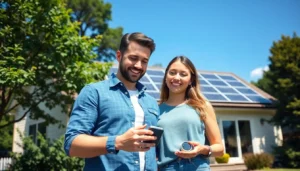Table of Contents
ToggleIn a world where energy bills seem to rise faster than a cat on a hot tin roof, reducing home energy use isn’t just smart—it’s essential. Imagine slashing those costs while saving the planet. It’s like winning the eco-lottery without even buying a ticket.
Understanding Home Energy Use Reduction
Reducing home energy use plays a critical role in managing costs and protecting the environment. A strategic approach leads to significant savings and a sustainable future.
Importance of Energy Efficiency
Energy efficiency impacts financial budgets positively. Improved insulation and energy-efficient appliances lower energy consumption dramatically. In fact, households can save up to 30% on monthly utility bills through effective measures. Adopting energy-efficient practices not only cuts costs but enhances the overall comfort of living spaces. Homeowners benefit from upgraded systems that often provide better performance while using less energy.
Environmental Impact
Environmental benefits of reducing energy use cannot be overstated. Decreased energy consumption leads to fewer greenhouse gas emissions, which fight climate change. For every kilowatt-hour saved, fewer fossil fuels are burned, reducing air pollution significantly. Additionally, using less energy conserves natural resources, decreasing dependence on non-renewable sources. By prioritizing home energy use reduction, communities create healthier surroundings and contribute to global sustainability efforts.
Strategies for Home Energy Use Reduction

Employing various strategies can drastically lower home energy consumption. Homeowners can enhance comfort and contribute to environmental sustainability by implementing effective energy-saving measures.
Upgrading Appliances
Opting for energy-efficient appliances significantly reduces energy use. Devices bearing the Energy Star label consume up to 50% less energy than standard models. Refrigerators, dishwashers, and washing machines represent key areas for upgrades. Selecting smart appliances allows for better energy management through automated controls. Energy-efficient lighting, such as LED bulbs, not only lasts longer but also uses 75% less energy compared to incandescent bulbs.
Enhancing Insulation
Improving insulation plays a crucial role in energy savings. Proper insulation in attics, walls, and floors minimizes heat loss during winter and heat gain during summer. According to the U.S. Department of Energy, well-insulated homes can save homeowners up to 20% on heating and cooling costs. Sealing gaps around windows and doors blocks drafts and prevents energy waste. Investing in materials like cellulose or spray foam boosts insulation effectiveness and enhances overall comfort while reducing energy bills.
Utilizing Renewable Energy Sources
Incorporating renewable energy technologies promotes sustainable living and less dependent on fossil fuels. Solar panels provide a reliable and clean energy source, potentially offsetting up to 100% of a home’s electricity use. Homeowners can also explore wind turbines if local conditions permit. Installing solar water heaters can save significantly on energy costs for heating water. Utilizing geothermal heating systems presents another energy-efficient alternative for maintaining comfortable indoor temperatures.
Behavioral Changes for Energy Savings
Adopting new behaviors can significantly enhance energy savings at home. Making small changes to daily routines leads to noticeable reductions in energy use.
Daily Energy-Saving Habits
Turning off lights in unoccupied rooms saves energy immediately. Adjusting thermostats provides flexibility for heating and cooling needs, allowing control based on daily schedules. Utilizing cold water for laundry reduces energy consumption, and air drying clothes cuts costs further. When using appliances, running the dishwasher and washing machine with full loads maximizes efficiency. Implementing habit changes, like unplugging devices not in use, eliminates phantom loads from electronics. Lastly, considering shorter showers decreases hot water usage and conserves energy.
Utilizing Smart Technology
Smart technology plays an essential role in modern energy management. Smart thermostats offer scheduling options and adapt to users’ habits, optimizing energy usage throughout the day. Integrating smart plugs allows monitoring and control of devices remotely, enabling energy-savings when away from home. Energy-efficient lighting, such as LED bulbs, pairs well with smart control systems for additional savings. Many smart appliances provide energy consumption data, encouraging informed decisions. Homeowners often find that investing in smart technology simplifies the path to energy efficiency and cost reductions.
Benefits of Home Energy Use Reduction
Reducing home energy use brings multiple advantages, ranging from financial savings to enhanced living conditions. These benefits contribute to a more sustainable lifestyle and healthier environments.
Cost Savings
Homeowners can achieve substantial cost savings through effective energy reduction strategies. Upgrading to energy-efficient appliances, particularly those with the Energy Star label, often cuts energy consumption by up to 50%. Improvements in insulation can yield savings of around 20% on heating and cooling costs. Behavior changes like turning off lights in unoccupied rooms and running full loads in appliances further amplify these savings. Communities benefit as decreased energy use leads to lower overall utility expenditures, promoting financial relief for families.
Increased Home Comfort
Energy reduction techniques significantly enhance home comfort. Improved insulation minimizes drafts, leading to more stable indoor temperatures year-round. Upgraded appliances often operate more quietly, adding to a peaceful living environment. Smart technology, such as programmable thermostats, allows for efficient temperature regulation, ensuring consistent comfort. A focus on energy-efficient practices not only boosts comfort but also creates a more enjoyable home atmosphere by reducing fluctuations in heating and cooling needs.
Reducing home energy use is a powerful way to enhance comfort while saving money and protecting the environment. By embracing energy-efficient appliances and improving insulation homeowners can make a significant impact on their utility bills and overall energy consumption. Simple behavioral changes further amplify these savings and promote a culture of sustainability.
As communities prioritize energy reduction strategies they contribute to a healthier planet and a more sustainable future. Each small step taken in energy efficiency not only benefits individual households but also supports broader environmental goals. The journey toward reduced energy use is both achievable and rewarding making it essential for every homeowner to get involved.




